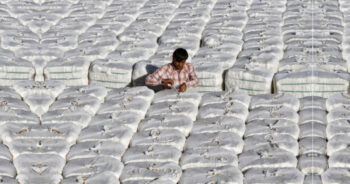 Cotton exports may be banned till September if other steps to quell record high cotton prices fail, two people aware of the development said, with the government recently asking industry players also brainstormed on immediate measures. The Government in the crucial meeting asked industry players to come back with specific suggestions by Monday, while urging exporters to voluntarily moderate their overseas shipments.
Cotton exports may be banned till September if other steps to quell record high cotton prices fail, two people aware of the development said, with the government recently asking industry players also brainstormed on immediate measures. The Government in the crucial meeting asked industry players to come back with specific suggestions by Monday, while urging exporters to voluntarily moderate their overseas shipments.
In a meeting convened by Minister of Commerce and Industry, Consumer Affairs and Textiles Piyush Goyal, officials and industry executives discussed a complete ban on exports till September as the last option on the table, according to the two people mentioned above, who participated. Took meeting.
There is mounting pressure on the government to intervene in the market amid a spurt in cotton prices affecting textile makers across the country. According to official data released earlier in the day, WPI-based inflation for textiles, which has been in double digits for the past several months, rose to 12.98 percent in April.
Goyal asked industry representatives to form a committee and come back to them with a solution by the end of the week, said one of the officials mentioned above. Only after other solutions are exhausted can the government proceed to ban exports, the person said.
The second person quoted above said, “The government has advised cotton exporters to ensure that they reduce exports by 25 percent as compared to last year so that more yarn is available for domestic consumption.”
A large number of textile manufacturers demanded a ban on the export of cotton. Industry executives said several other suggestions had been made.
Federation of Indian Export Organization (FEIO) informed the ministry that high input cost is posing a challenge for exporters. It suggested that cotton be brought under the Essential Commodities Act, which allows the government to control the price, production, supply and distribution of commodities placed under the list.
A government official said such a proposal should come from the Ministry of Textiles. “To bring cotton under the Essential Commodities Act, the Textiles Ministry will have to make a request to the Directorate General of Foreign Trade (DGFT). Such request is yet to reach DGFT.”
“Certain inputs like cotton can be brought under the Essential Commodities Act and the Cotton Corporation of India (a state-owned trader) can be asked to sell cotton only to genuine users,” FIEO said.
Earlier this year, the government had cut import duty on raw cotton by 10 percent till September. However, this did not help bring down the prices.
Textiles Secretary Upendra Prasad Singh had told last month that cotton exports could be banned if prices continued to rise. Cotton prices have barely doubled in a year 90,000 per candy, with prices of some varieties touching 100,000 per candy. The ban may free up cotton for the domestic market and thus help soften the prices. High cotton prices disproportionately affect the Indian textile industry, as it is heavily dependent on cotton, unlike other markets, where man-made fibers are the bulk of it. Singh had said that cotton prices are unlikely to come down before October when the new cotton crop arrives.










